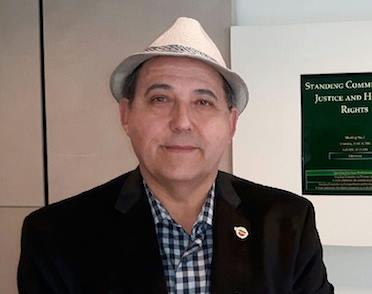By: Julia Archelene Magsombol, Local Journalism Initiative Reporter, The Columbia Valley Pioneer
They say that pain becomes less as time passes, but in other cases, it doesn’t — we just learn from it and manage to survive and look for tomorrow. This mirrors the life of Kim Beaudin, the national vice-chief of the Congress of Aboriginal Peoples (CAP).
The member of the Michel Indian Band #474, Treaty 6 territory, speaks openly about his story and what “truth and reconciliation” means to him.
“We still have a lot of work to do to educate other Canadians. We have a lot of work to do regarding our people, regarding what it’s really about . . . the struggle,” he said.
He sincerely hopes that National Day for Truth and Reconciliation resonates with Canadians.
“Growing up, I didn’t know anything about this. They didn’t teach you about the history, the contributions — how Indigenous Peoples were part of building this nation. None of that was talked about at all. It was never mentioned in any of the books or anything. Education is very important.”
In February 2023, CBC News wrote a story about Indigenous compulsory learning. Students are glad they are finally learning about it and how this is an eye-opening experience for them, but some students also mentioned that they are “upset that [they’d] never been taught about residential schools before.”
For more information, read: https://www.cbc.ca/news/canada/edu-indigenous-compulsory-learning-1.6738509.
In the news article, one student said, “Hearing the complete opposite, like what it was like, hearing Indigenous voices of residential school survivors … I think it’s essential for all kids, especially our age, to learn that.”
Many of Beaudin’s family relations attended residential schools, including his grandfather. He doesn’t know the exact numbers of his family who attended the school, but he is still learning about them. However, whenever Beaudin asks about his grandfather’s story, he does not want to talk about it. Beaudin’s mother would also stop him from asking questions, and that’s why he only learned a little about his history.
“They move around a lot because they want to avoid the government. They were concerned about the whole family being scooped up by government officials in Canada and taken away and dragged into residential schools. My grandpa learned a lot from that.”
Moving to a lot of places made it difficult for Beaudin to build friendships and learn about their land and history. Unfortunately, history repeated itself, and Saskatchewan government officials’ social services took his daughter away from him.
“She was taken away from me when I was 21 years old. The services took her and adopted her out.”
Beaudin finally understood his family and why they moved around.” We moved everywhere. It was crazy. And I didn’t understand why. Now, I know why.”
Beaudin was not in the drug scene and did not suffer any addictions when the government took his child. He also mentioned that he wasn’t drinking or smoking. He was trying to be the best father figure his daughter could have.
“But I saw some of the notes (from social services), and when they took my kid away, there was only one reason . . . I was Indigenous.”
That’s why Beaudin argued that in truth and reconciliation, people must know what Indigenous people went through in order to move forward. This is also one of the reasons why he’s doing a lot of things now as a vice chief of the CAP.
“I wanted to make sure that my kids had stability.”
He finally saw his daughter after she turned 18. A few years later, his daughter asked why it needed to happen. Everything is still so vivid for Beaudin.
“I don’t know if you ever do heal. You always have what could have been. …… you always think about how my life would have been different if she was around or how her life would have been different. You always think about that,” he says. “I remember it, just like yesterday, when they took her from me … just like yesterday.”
Beaudin also sympathizes with his daughter’s struggles. “I know her life wasn’t perfect because she was adopted out. She told me that she felt out of place a lot of times.”
Despite all of this, Beaudin happily shared that they both have closure on that and have a good relationship now. He’s excited because he will soon meet his granddaughter.
“It’s funny because my granddaughter, who is already 19 … she was the same age that I saw her mother for the first time,” he laughs.
Beaudin may not ever forget what happened but he is optimistic about the future and hopes to break the ongoing cycle of trauma and abuse among Indigenous Peoples.
Looking ahead, he is confident things will get better by being positive and teaching the children what they need to know.
